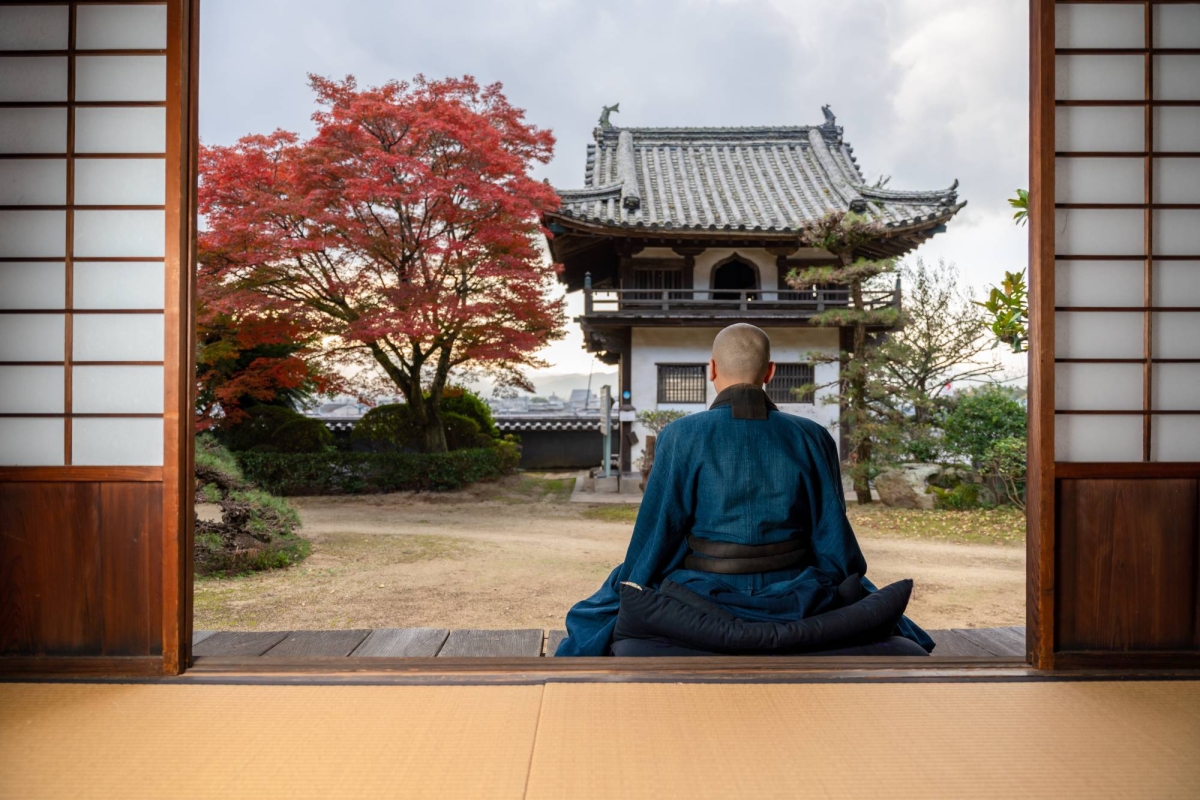Happiness
The Ultimate Guide to Japanese Wisdom for a Good Life
Most of us are working hard, scrolling harder, and still wondering why lasting happiness feels out of reach. Japanese wisdom offers a different answer: a good life is built through connection, quiet rituals, and everyday meaning—not endless self-optimization.
In the next few minutes, you’ll learn how three timeless ideas—omoiyari, wabi-sabi, and ichi-go ichi-e—can give you a practical, research-aligned framework for a calmer, more sustainable life.

The Hidden Problem: Why We’re Chasing Happiness and Feeling Worse
Modern life tells us that happiness is a solo project: achieve more, upgrade more, fix yourself faster. Yet anxiety, burnout, and loneliness remain high worldwide.
Common signs your current approach isn’t working:
- You hit goals but feel strangely empty within days.
- You fear falling behind if you rest or slow down.
- You compare your life to others and feel perpetually “not enough.”
- Your days are full, but your connections feel thin.
Key insight: When happiness is treated only as a personal achievement, it becomes fragile, competitive, and exhausting.
The Real Challenge: Our Culture Rewards the Wrong Metrics
We are taught to measure life by:
- Titles, income, and status.
- Visible achievements and highlight moments.
- Constant positivity and self-confidence.
But research in cultural psychology shows that this hyper-individual, performance-based happiness can backfire. It increases pressure, isolates us from others, and makes our mood dependent on external wins.
Recent findings from cross-cultural studies and insights cited by experts at Harvard (2024) and Stanford researchers highlight a crucial pattern: communities that emphasize interdependence, contribution, and emotional authenticity often report more stable well-being than those driven purely by individual success.
Why Traditional Approaches to Happiness Fail
Most mainstream strategies miss three realities:
- They assume unlimited personal willpower.
- They ignore how relationships and community shape our emotions.
- They pretend life can be controlled, perfected, or permanently optimized.
This creates what many experience in 2025:
- Wellness routines that feel like another job.
- Gratitude lists written without feeling.
- “Self-love” talk that doesn’t touch deeper loneliness.
When happiness is framed as a solo race, others become rivals, not allies—and joy becomes something you must earn, not something you cultivate together.
Here is where Japanese wisdom for a good life offers a quiet but powerful reset.
The Root Cause (Backed by Research and Wisdom Traditions)
Cultural psychologists studying Japan highlight a different assumption: a good life is relational, rhythmic, and imperfect.
Key principles emerging from Japanese perspectives and cross-cultural research:
- Well-being grows from mutual support, not just self-esteem.
- Emotional balance matters more than constant highs.
- Ordinary days—when protected and appreciated—are a core metric of a life well-lived.
This aligns with global findings from positive psychology and resilience research:
- Strong social ties predict health and longevity.
- Meaningful contribution (not just achievement) boosts life satisfaction.
- Flexible emotion regulation supports long-term stability.
Japanese wisdom doesn’t reject ambition. It reframes it inside a wider context: connection, humility, nature, and time.

The Japanese Wisdom Framework for a Good Life
Below is a simple framework built from three key concepts. Together, they form a practical, modern application of Japanese wisdom good principles:
- Omoiyari: Relational kindness (outward and inward).
- Wabi-sabi: Acceptance of imperfection and impermanence.
- Ichi-go ichi-e: Full presence in unrepeatable moments.
Think of them as three lenses that reshape how you:
- Treat people.
- Treat yourself.
- Treat your time.
1. Omoiyari: Kindness That Connects and Protects
Omoiyari is thoughtful empathy in action: sensing others’ needs and responding with quiet care, often without being asked.
In a good life:
- You notice small cues: a friend’s tired tone, a colleague’s silence in meetings.
- You offer support that fits, not grand gestures designed for applause.
- You extend the same attunement to yourself.
Featured snippet (definition-length):
Omoiyari is a Japanese concept of intuitive, considerate empathy—being gently aware of others’ feelings and needs, responding with respectful support, and applying that same compassionate awareness to your own well-being.
Practical examples:
- Bringing tea to a coworker staying late, without making it a big performance.
- Sending a short check-in message instead of assuming “they’d reach out if it mattered.”
- Giving yourself permission to rest when your body signals overload.
Omoiyari turns relationships into a shared safety net—reducing stress, deepening trust, and grounding your happiness beyond individual wins.
2. Wabi-sabi: The Strength of Imperfect, Ordinary Days
Wabi-sabi invites you to find beauty in the incomplete, the aging, the modest. It’s not about giving up; it’s about seeing clearly.
Core ideas:
- Every stage—beginning, messy middle, worn edges—has its own quiet value.
- A stable, “ordinary” day can be a peak experience when you’re fully present.
- Letting go of perfectionism frees energy for what actually matters.
Featured snippet (40–50 words):
Wabi-sabi is a Japanese aesthetic and life philosophy that celebrates imperfection, impermanence, and simplicity. Instead of chasing flawless outcomes, it teaches us to appreciate worn-in objects, evolving relationships, and ordinary days as authentic sources of calm, gratitude, and long-term happiness.
Modern applications (2025 reality):
- Accepting that your home won’t look like social media, but it can feel safe and warm.
- Valuing a consistent, simple workout over an extreme “all-or-nothing” plan.
- Recognizing that healing, career growth, and relationships are non-linear.
3. Ichi-go ichi-e: This Moment Will Not Repeat
Ichi-go ichi-e means “one time, one meeting.” Every encounter, every shared meal, every conversation on a commute is unique—and will never unfold in exactly the same way again.
This mindset cuts through autopilot:
- You treat daily interactions as meaningful, not filler.
- You reduce regret by actually being where your body is.
- You extract depth from short, real moments instead of chasing constant novelty.
Featured snippet (40–50 words):
Ichi-go ichi-e is a Japanese principle reminding us that each moment and meeting is once-in-a-lifetime in its exact form. By honoring its uniqueness with full presence and gratitude, we deepen connection, reduce regret, and turn ordinary experiences into lasting sources of meaning.
People Also Ask: Key Questions About Japanese Wisdom for a Good Life
How can Japanese wisdom improve my daily happiness?
Japanese wisdom improves daily happiness by shifting focus from peak achievements to steady connection, presence, and acceptance. By practicing omoiyari, embracing wabi-sabi, and living ichi-go ichi-e, you reduce pressure, savor ordinary joys, and build resilience that modern, high-speed life often erodes.
Is Japanese wisdom just about being passive or conforming?
No. A Japanese wisdom good approach is not passivity; it’s intentional balance. It encourages thoughtful action, community care, and sustainable ambition rather than frantic overwork. You still pursue goals—but with grounded expectations, shared support, and less self-criticism.
Can I use these concepts without being Japanese?
Yes. These ideas are transferable mindsets, not cultural costumes. You honor their origin by applying them respectfully: focus on empathy over aesthetics, substance over trend, and learning over appropriation.
How does this compare to Western happiness strategies?
Western approaches often prioritize self-esteem and autonomy. Japanese perspectives complement this by emphasizing interdependence, emotional nuance, and long-term stability. Together, they form a more complete model: confident yet connected, driven yet compassionate.
Step-by-Step: How to Apply Japanese Wisdom in 7 Practical Moves
Use this framework over 30–90 days to integrate these principles into real life.
Step 1: Redefine What a “Good Life” Means to You
Write a 3–5 line definition of a life well-lived that includes:
- Relationships (Who are you supporting and supported by?)
- Ordinary joys (What simple moments matter most?)
- Contribution (How do you positively impact others?)
Make sure it goes beyond status and constant excitement.
Step 2: Practice Micro-Omoiyari Daily
Each day, choose one small, concrete act of consideration:
- Send a sincere “thinking of you” message.
- Listen without interrupting once today.
- Do one unnoticed helpful task at home or work.
Then mirror it inward:
- Take a short break without guilt.
- Speak to yourself as you would to a close friend.
Step 3: Design a Wabi-sabi Environment
Shift from “perfect” to “peaceful.”
- Keep one slightly worn object you love—a mug, notebook, scarf—as a reminder that value grows with use.
- Clear one small area (desk, nightstand) and let it be simple, not showroom-level.
- When something goes off-plan, ask: “What is still workable and worthy here?”
Step 4: Create Ichi-go ichi-e Moments on Purpose
Choose one daily activity to do with full attention:
- Your first sip of coffee.
- A commute walk without your phone.
- A 5-minute conversation with a partner, child, or friend.
Treat it like a once-in-a-lifetime micro-ceremony: no multitasking, no rushing.
Step 5: Shift from Outcome Obsession to Process Trust
Inspired by Japanese craftsmanship and long-term thinking:
- Break large goals into small, repeatable actions.
- Celebrate consistency over intensity (10 minutes daily beats 2 hours once a month).
- Reflect weekly: “What felt aligned, not just impressive?”
Step 6: Build Support Systems, Not Solo Plans
A Japanese wisdom good mindset frames happiness as co-created.
- Share your intentions with a friend and check in weekly.
- Start a short ritual at work: a 3-minute team gratitude round, or a quiet start.
- Join or create a small community (online or offline) focused on mutual encouragement, not comparison.
Step 7: Reflect Monthly with Three Questions
Once a month, journal briefly:
- Where did I feel quietly content this month?
- Where did I ignore my needs or others’ needs?
- What small change would make my ordinary days kinder?
This reflection closes the loop between intention and reality.

What Results Can You Expect—and When?
Real change is subtle at first, then obvious.
Short term (Days 1–7):
- Slight reduction in mental noise during chosen mindful moments.
- Small sparks of gratitude for things you usually rush past.
Medium term (Weeks 2–6):
- Less emotional whiplash from daily wins and losses.
- Warmer interactions; people feel more seen and respond in kind.
- More acceptance of imperfections at home, work, and in yourself.
Long term (2–6 months+):
- A stable baseline of contentment, even when life isn’t “perfect.”
- Stronger, more resilient relationships that buffer stress.
- A personal definition of success aligned with your values, not algorithms.
The real outcome of integrating these principles is not a constantly happy life, but a deeply livable one—steadier, kinder, and more your own.
Troubleshooting: When Japanese Wisdom Feels Hard to Apply
If you struggle to live these ideas, you’re not failing; you’re meeting your conditioning.
Common obstacles and fixes:
“I don’t have time for this.”
→ Start with 30 seconds: one slow breath before meetings, one mindful sip, one kind message.“Being gentle with myself feels lazy.”
→ Reframe: Sustainable effort outperforms burnout. Many top performers and clinicians now emphasize recovery as a performance skill.“No one around me thinks this way.” → Lead quietly. Consistent omoiyari and presence often shift dynamics over time. You only need one or two allies to start a new microculture.
“I keep slipping back into old habits.”
→ Expect this. Use wabi-sabi on your own growth: imperfect progress is still progress.
Bringing It All Together
Japanese wisdom does not promise a flawless life. It offers something better suited to our uncertain, accelerated world: a way to live that is grounded, relational, and gently hopeful.
By practicing omoiyari, embracing wabi-sabi, and honoring ichi-go ichi-e, you:
- Turn ordinary days into your greatest asset.
- Build happiness that doesn’t collapse when plans change.
- Walk through life with a quiet premonition of joy—alert to small gifts already present.
A good life, it turns out, is less about finally arriving, and more about how carefully, kindly, and attentively we move through the moments we have.











